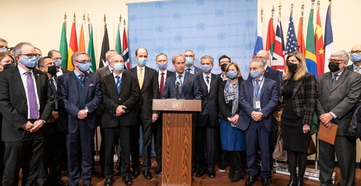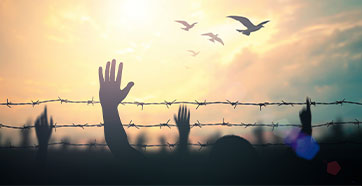War crimes: Last Nazi trials demonstrate path to individual accountability

Sobibor concentration camp text on stone wall dedicated to the Jews who were killed in the Holocaust, New England Holocaust Memorial on 21 April, 2013, Boston, USA. FMUA/AdobeStock.com
The ongoing trials in Germany of a former Nazi concentration camp guard and secretary demonstrate a path to individual accountability for past, present and future war crimes worldwide. ‘There is no statute of limitations for international criminal law,’ says TJ Adhihetty, Co-Chair of the IBA War Crimes Committee and Adjunct Professor at Osgoode Hall Law School within York University. ‘These cases […] demonstrate that it doesn’t matter if an arrest warrant is issued tomorrow against you. It can be issued against you in 15 years [or beyond].’
‘And it’s not just going to be the generals and the presidents and prime ministers who will be held responsible,’ adds Adhihetty. ‘It is also the individual soldiers, for example. So those involved in armed conflict, be it in Ukraine now or elsewhere, have to be mindful that their actions are going to be watched and monitored.’
The trials in Germany began in October 2021. They involve Josef S, a former SS member and camp guard, who is accused of being accessory to 3,518 murders committed at the Sachsenhausen camp between 1942-45. He is being tried at Neuruppin State Court, which reportedly has moved the proceedings to Brandenburg. He pleads not guilty.
Irmgard Furchner, the first woman to be put on trial for Nazi crimes in decades, was secretary to a camp commander in 1943–45 and is accused of being accessory to more than 10,000 systematic murders. She is on trial in Itzehoe. Her lawyer, Wolf Molkentin, says Furchner, who was 18 at the time, was not aware of the true nature of what went on.
Both trials come as part of a legal strategy piloted in 2011. Under this framework, prosecutors do not prove that the accused committed or commissioned murders, but that they would have known what was happening and, through their work, contributed to the running of the death camps during the Second World War. Prosecutors have pursued convictions – with mixed success – of camp guards, dentists, doctors and bookkeepers.
Those involved in armed conflict, be it in Ukraine now or elsewhere, have to be mindful that their actions are going to be watched and monitored
TJ Adhihetty
Co-Chair, IBA War Crimes Committee
Sarah McIntosh, an associate for the Ferencz International Justice Initiative at the US Holocaust Memorial Museum, tells Global Insight that ‘This approach of prosecuting lower-level perpetrators reflects the fact that mass atrocities are not typically committed by one single person, but require many people to work together in concert.’
She adds that the strategy generally coheres with the various modes of liability in international criminal law, under which ‘criminal liability extends not only to those who actually commit these crimes, but it can also extend to those who plan, instigate, order, or aid and abet them’.
These and previous defendants have acknowledged the violence that took place, but denied their personal guilt. For example, Furchner’s lawyer has told the Court that Furchner does not deny the crimes of the Holocaust, but ‘she simply rejects the charge around which this trial ultimately revolves, that she was personally guilty of a crime.’
Prosecutors have been criticised for targeting low-ranking camp staff. But Elizabeth Barry White, an historian at the US Holocaust Memorial Museum, says the trials ‘show how ordinary people can be manipulated to participate in mass atrocities, and they stand for the principle that everyone who participates shares responsibility for the crimes and should be brought to account.’
It has only recently become possible for prosecutors to do so. In 1969, Germany’s highest court dealt a blow to prosecutors of Nazi crimes by overturning the conviction of a former SS member and Auschwitz guard on the grounds that working in a concentration camp was not a crime in itself.
White tells Global Insight that ‘Because of how murder is defined in German law, prosecutors of Nazi crimes could only charge perpetrators with murder if they could prove that the defendants had not only killed Nazi victims but had done so on their own initiative and with either a base motive or excessive cruelty.’
‘Consequently, even SS officers who oversaw the shooting or gassing of thousands of victims could only be tried as accessories to murder if it could only be shown that they were “just” following orders,’ she says.
As such, relatively few Nazi criminals were prosecuted over the years. The trials that did occur, White says, ‘tended to showcase defendants who had acted with special brutality, reinforcing the impression that the “real” criminals had been monsters while all the others involved were ordinary Germans caught in a situation over which they had no control.’
In 2011, prosecutors finally challenged the high bar for accountability, and succeeded. John Demjanjuk was tried and convicted as accessory to 27,900 murders at Sobibor concentration camp where he had worked as a guard. Demjanjuk appealed and died before a verdict was delivered, so his conviction was not legally binding.
It took several attempts to secure another conviction. But, in 2015, the ‘bookkeeper of Auschwitz’, Oskar Groening, was convicted as an accessory to the murder of 300,000 people and given a four year sentence, which was upheld by the German Federal Court of Justice.
With the strategy affirmed by the Federal Court’s ruling, prosecutors have been racing against time to secure convictions before their last possible suspects pass away.
The judicial process is hampered again as defendants can be too frail to sit through full days. Several previous defendants faced juvenile courts because of their age at the time of the alleged crimes. Furchner, too, faces juvenile court, but Josef S – the oldest person to ever face trial for alleged Nazi crimes, at 101 – is being tried as an adult.
In light of these challenges, the office that investigates potential suspects and recommends prosecutions has faced pressure to cease operations.
But Adhihetty tells Global Insight, ‘no-one should escape justice because of time alone.’ He adds, ‘many of the victims have passed away, but some are still alive and their families are still alive, and their families still deserve the justice to say this was a massive crime where many people were involved.’
Adhihetty stresses that the defendants receive a fair trial, and it’s not a foregone conclusion that they will be found guilty. ‘That’s a great point of comfort to society, to know that it’s being done properly. It is not an act of vengeance. It is an act of just prosecution under the law.’



